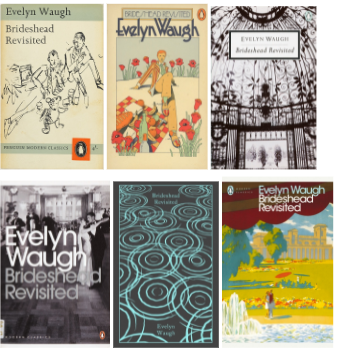By: Jennifer Bortner
Published at the end of May 1945, Evelyn Waugh’s Brideshead Revisited is known as the quintessential English novel. The story follows Captain Charles Ryder and his complex affairs with the Flytes, a high society Catholic family. The novel discusses themes of dependence in relationships, the complexities of religious faith, and even contains undertones of homoeroticism. In 1930, Waugh converted to Catholicism and many people see this novel as the public debut of his religious faith as he explores its importance throughout the novel. The story begins as Charles, a British army officer, is stationed at Brideshead Castle, a manor of Gatsbian proportions. Brideshead is owned by the Marchmains, the family of Lord Sebastian Flyte, who Charles meets at Oxford. During their first year there, Charles and Sebastain become fast friends and later a romance even blossoms between them. During school breaks, Sebastian brings Charles to Brideshead where Charles questions Sebastian’s faith. In this vein, Sebastian becomes a borderline alcoholic and this drives the two apart. Still, Charles becomes very close with the entire family, later marrying Sebastian’s sister Julia whose devout Catholic practices make their relationship unsuccessful as Charles begins the book a stubborn agnostic who undergoes religious shifts throughout the novel.
Given this novel is fairly pious and discusses relationships more than sexuality, it was not necessarily very controversial in its time. The biggest attempt at censorship of Brideshead Revisited in America came in 2005, sixty years after the book had been published. PEN America makes a really interesting commentary on the censorship history of this novel comparing the Alabama legislative challenge to the novel to the challenges one of the characters, Sebastian Flyte, faces from his mother Lady Marchmain. Like Lady Marchmain in the novel, the 2005 legislation proposed by Alabama Representative Gerald Allen aimed to perpetuate faith and morals among young people, as well as to shelter them. The legislation would prevent the allocation and use of public funding for “purchase of textbooks or library materials that recognize or promote homosexuality as an acceptable lifestyle.” If the bill had passed, it would have almost completely censored any discussion of homosexuality in schools, libraries, and universities with state funding. However, it particularly would have challenged classic literature containing gay characters like Brideshead Revisited. This is a special case of censorship because the novel only contains a gay characters and in no way advocates for queer identities. Waugh even refers to homosexuality as a a “mortal sin.” Yet, solely for representing gay characters and relationships, Brideshead Revisited became a controversial novel.

About the Author
English author Evelyn Waugh was born in Hampstead in 1903 to a family full of authors and publishers. Waugh graduated from Lancing and Hertford Colleges with majors in journalism and modern history. In 1928, Waugh published his first book Rossetti: His Life and Works. He wrote a variety of novels in addition to his biographical works, memoirs, travel writing, and journalism. Today, he is well known for his cool satirical style even though it was neglected in Brideshead Revisited, which remains one of his most famous works. Several of his novels, including Brideshead Revisited, were among Modern Library’s selected 100 best novels of the twentieth century. Waugh passed away in 1966, but his work was repopularized due to the BBC show Brideshead Revisited and other film adaptations that followed that. The 1981 mini series won numerous accolades including six emmys, eight BAFTA TV awards, and two golden globes. To this day, Waugh is a big part of both cultural dialogue and literary education with his works considered captivating classics.
Further Reading
On Evelyn Waugh’s Brideshead Revisited
Cianciotto, Jason, et al. LGBT Youth in America’s Schools. Ukraine, University of Michigan Press, 2012.
https://archive.nytimes.com/www.nytimes.com/books/97/05/04/reviews/waugh-brideshead.html
‘We have to protect people’ | Books
Brideshead Revisited at 75: How the covers have changed through the decades